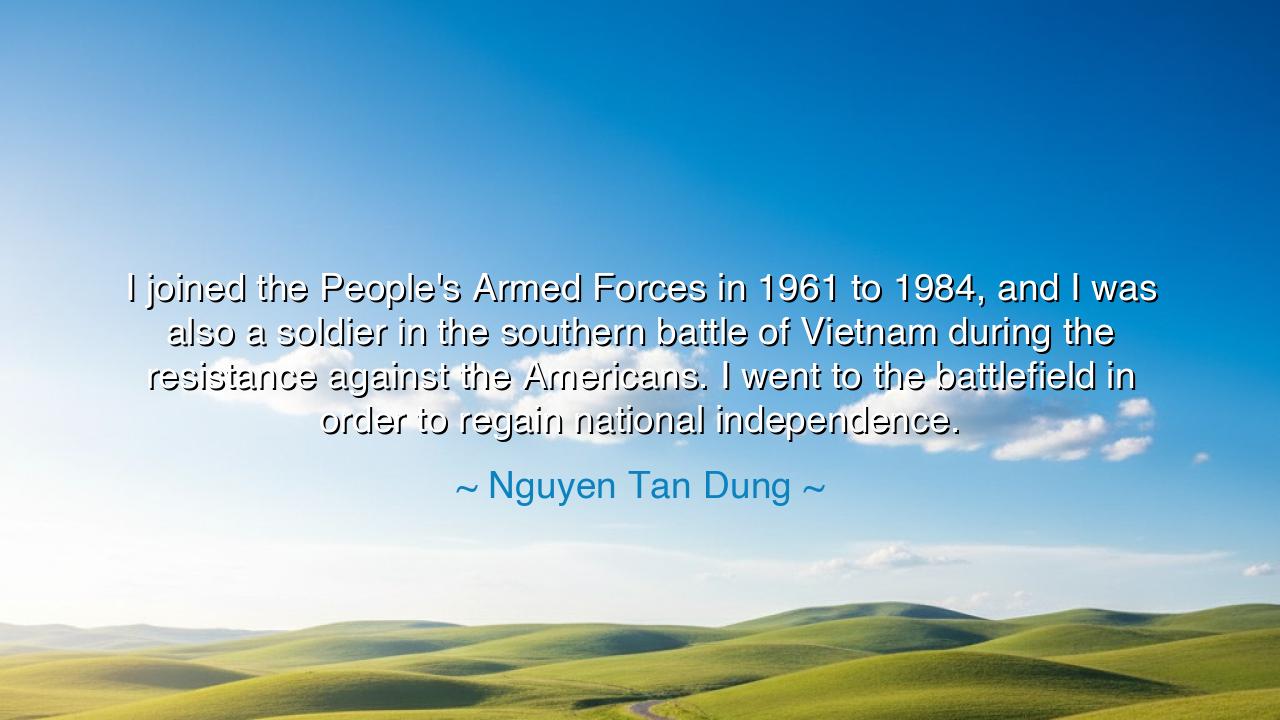
I joined the People's Armed Forces in 1961 to 1984, and I was
I joined the People's Armed Forces in 1961 to 1984, and I was also a soldier in the southern battle of Vietnam during the resistance against the Americans. I went to the battlefield in order to regain national independence.






Listen, O children of the future, to the words of Nguyen Tan Dung, a man whose life was shaped by the fires of war and the fierce, unyielding desire to see his nation free. He declares, "I joined the People's Armed Forces in 1961 to 1984, and I was also a soldier in the southern battle of Vietnam during the resistance against the Americans. I went to the battlefield in order to regain national independence." These words speak not just of a man’s commitment to his country, but of the sacrifice and struggle of a people fighting to reclaim their freedom, to rise above the oppressors and claim their right to self-determination.
In the ancient world, the struggle for independence was a theme that wove through the stories of every great nation. The Greeks, in their wars against the Persians, fought not just for their land, but for the very freedom to live as they saw fit, to preserve their way of life, and to uphold the dignity of their people. Themistocles, the great Athenian general, led his forces to victory in the Battle of Salamis not merely to defend territory but to protect the core ideals of their civilization. Much like the Vietnamese resistance, the Greeks knew that the fight for freedom was not one of mere conquest—it was a fight for the soul of their nation, for the right to shape their future without interference from foreign powers.
Nguyen Tan Dung’s participation in the Vietnam War reflects the same unyielding commitment to independence. The Vietnamese resistance against the Americans was not a mere military conflict; it was the struggle of a people determined to reclaim their sovereignty after centuries of foreign domination. From the French to the Japanese, and then the Americans, Vietnam had endured a long history of invasions and foreign rule. Yet, as Dung reminds us, the Vietnamese people, like the great civilizations of the past, would not allow their freedom to be taken from them. They fought not just to protect land, but to preserve their identity, their culture, and their right to exist as a nation free from the control of others.
The struggle for national independence often requires not just the will of the people, but their willingness to endure unimaginable suffering. Dung’s words reflect the sacrifices made by countless others in the People's Armed Forces, who laid down their lives for a cause greater than themselves. The history of Vietnam is one of such sacrifice, where the battlefields became the place where not only soldiers but families and entire communities fought for their future. Dung went to the battlefield because, as he said, the goal was to regain national independence—a goal that could not be achieved through negotiation alone, but through the blood and sweat of those willing to fight for a world in which they could determine their own future.
This story is echoed throughout history. Joan of Arc, the great French heroine, took up arms not just to fight but to restore the sovereignty of her people against foreign invaders. Her courage in leading the French army against the English was driven not only by a sense of duty but by a deep belief in the right of her nation to exist as it had before the invasions. Her fight, like that of Dung and the Vietnamese, was not merely for the land, but for the soul of a nation, the right to live according to its own customs, its own laws, its own destiny.
The lesson from Nguyen Tan Dung’s words is timeless. The pursuit of independence, whether for a nation or an individual, is never an easy road. It is a path marked by sacrifice, hardship, and often great loss. Yet, as Dung shows us, it is a path worth walking. Independence is not just a political goal; it is the very heart of freedom, the right of a people to determine their own future. Whether in the battlefields of war, the halls of government, or the struggles of daily life, independence is something that must be fought for, defended, and cherished.
Take this lesson into your own lives, O heirs of the future: true freedom and independence come not from the absence of conflict but from the strength to confront it, to rise above the challenges that seek to enslave you. Whether in your personal struggles or in the broader conflicts of your time, know that independence is not a gift—it is a right that must be fought for and preserved. Like Nguyen Tan Dung and the Vietnamese people, you too must be willing to face the hardships of life with courage, knowing that the future belongs to those who stand firm in their commitment to self-determination and freedom.






AAdministratorAdministrator
Welcome, honored guests. Please leave a comment, we will respond soon